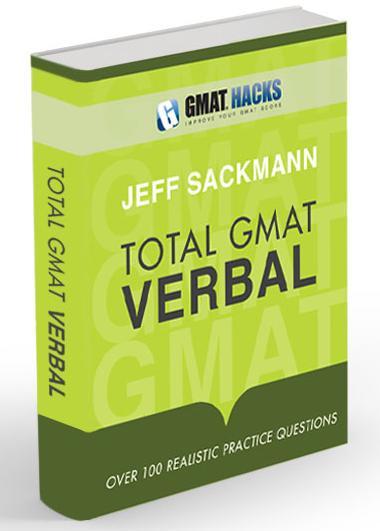
Bookshelf
|
|
Total GMAT Math Jeff's complete Quant guide, on sale now! |
|
|
Total GMAT Verbal Everything you need to ace GMAT Verbal! |
1,800 Practice Math Questions
Buy Jeff's books at Amazon.com

GMAT Official Guide, with IR
OG Math | OG Verbal
OG12 & Quant Rev solutions!
GMAT Question of the Day
Beginner's Guide to the GMAT
GMAT Hacks Affiliate Program

Recent Hacks

Categories
- General Study Tips
- Goals and Planning
- CAT Strategy
- The Mental Game
- GMAT Math Strategy
- GMAT Math Topics
- Mental Math
- Data Sufficiency
- Critical Reasoning
- Reading Comprehension
- Sentence Correction
- Analytical Writing Assessment
- Integrated Reasoning
- IR Explained
- Business School Admissions
- GMAT Prep Resources
- Practice Questions
- Total GMAT Math
- Total GMAT Verbal
- GMAT 111

Reading Comprehension Passages
| You should follow me on Twitter. While you're at it, take a moment to subscribe to GMAT Hacks via RSS or Email. |
There are a variety of topics that the GMAT likes to cover in its reading comprehension passages. Some are considered more difficult than others; for instance, it's a rare GMAT test-taker who is excited to see a biology passage.
While the range of potential subjects is wide, it is somewhat predictable. It's yet another reason why practicing with realistic materials--namely, The Official Guide and the Verbal supplement--is so important. The mix of content areas in those books very closely approximates what you can expect when you sit for the GMAT. (The same is true of my Total GMAT Verbal, which contains practice passages and questions carefully patterned after those on the test itself.)
Science Passages
On both reading comprehension and critical reasoning, the GMAT loves biology. I don't know exactly why that is; perhaps the test-makers want you to take over a biotech company after getting your MBA. Regardless of the reason, biology is by far the most common branch of science covered in GMAT passages.
Other common topics are physics (particularly astronomy) and--again, I can't explain this one--archaeology. With the exception of astronomy passages, the emphasis is generally on things having to do with people. For instance, a biology passage might focus on life-saving pharmaceuticals, or an archaeology passage may be about what a recently uncovered civilization has to say about human nature.
I've written about how to deal with the specific challenges that science passages offer here.
Business and Economics Passages
While science passages are considered difficult, I think most test-takers don't worry too much about business-oriented topics. After all, you probably have some interest in the corporate world if you're applying to MBA programs!
However, don't let that attitude seep into related economics passages. Many people think they understand economics better than they do, and GMAT passages often discuss multiple ways of addressing the same problem. In an econ passage, be especially careful to answer questions based on the content in the passage (not other things you've read) and be clear on the differing opinions that the passage presents.
Social Sciences Passages
These passages are a mix of history, political science, and some economics. Occasionally, though, you'll also see topics such as ethnic studies and literature.
For me, these are the easiest: one of my majors in college was in the liberal arts, so handling academic-style writing is a breeze. But therein lies the trap for many people: just because the content might be seen as "lightweight" (compared to denser science passages) doesn't mean it will be easy for you.
Academics in the liberal arts--the people who write, or at least inspire, the passages in this category--develop specialized vocabularies of their own, and don't hesitate to use them. Like science passages, social science passages define their terms, but that means you have to pay just as close of attention to unfamiliar language in this type of content than with physics or biology.
What To Expect
As a very general rule, the better you do on the GMAT Verbal section, the more science passages you'll see. But, as I say, that's no more than a rule of thumb. You'll typically have four or five passages per section, and there's a degree of randomness to every aspect of the test.
Be ready for each type of passage, and be sure to keep practicing realistic questions so that you're ready for the unique challenges each content area presents. And be sure to time yourself; as I wrote recently, you should be able to read and digest any passage in 3-4 minutes--no matter what the subject matter!
About the author: Jeff Sackmann has written many GMAT preparation books, including the popular Total GMAT Math, Total GMAT Verbal, and GMAT 111. He has also created explanations for problems in The Official Guide, as well as 1,800 practice GMAT math questions.
 |
Total GMAT Verbal
The comprehensive guide to the GMAT Verbal section. Recognize, dissect, and master every question type
you'll face on the test. Everything you need, all in one place, including 100+ realistic practice questions. |